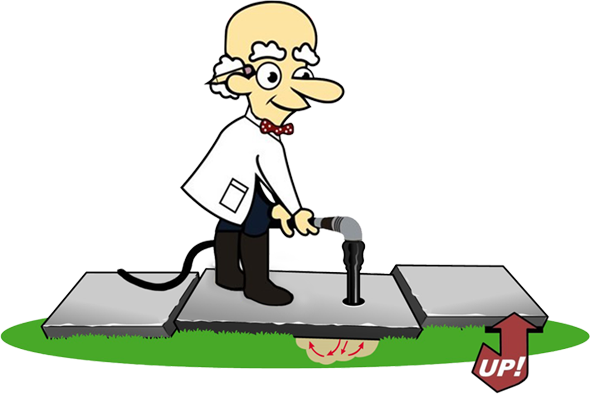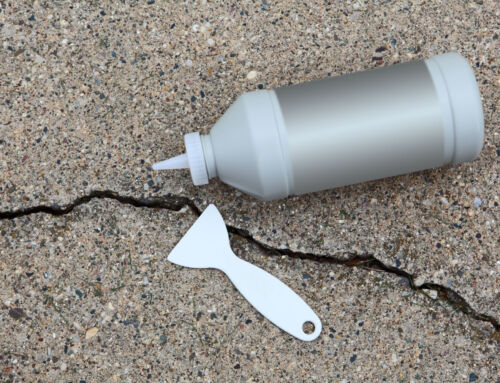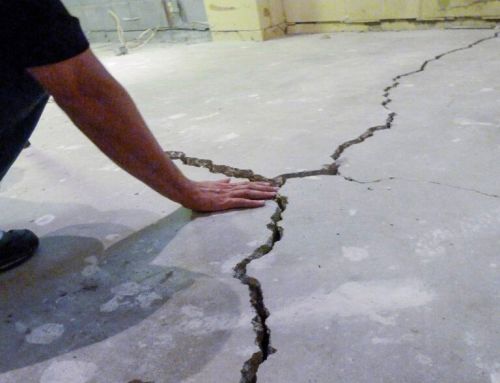IN THIS ARTICLE
All You Need to Know about Concrete Floor Sealing for New Jersey Homeowners.
Concrete is strong stuff. You see it everywhere – sidewalks, driveways, even big buildings. But even tough concrete can get damaged by weather, road salt, and just plain use. That’s where sealing comes in.
Sealing concrete means putting a clear coat on top to protect it. This helps stop damage and makes your concrete last longer. In this guide, we’ll cover what you need to know about sealing your concrete floors. We’ll talk about why it’s good, the different types of sealers, and when you can walk on it after it’s sealed.
We don’t do concrete sealing, but we are the experts at concrete leveling all over the cities of NJ, which truly restores your concrete’s stability and safety.
What is Concrete Sealing?
Concrete sealing is simply putting a protective layer on your concrete. This layer, called a sealant, acts like a shield. It stops water, chemicals, and other things from getting into the concrete and causing damage.
How Does Concrete Sealing Work?
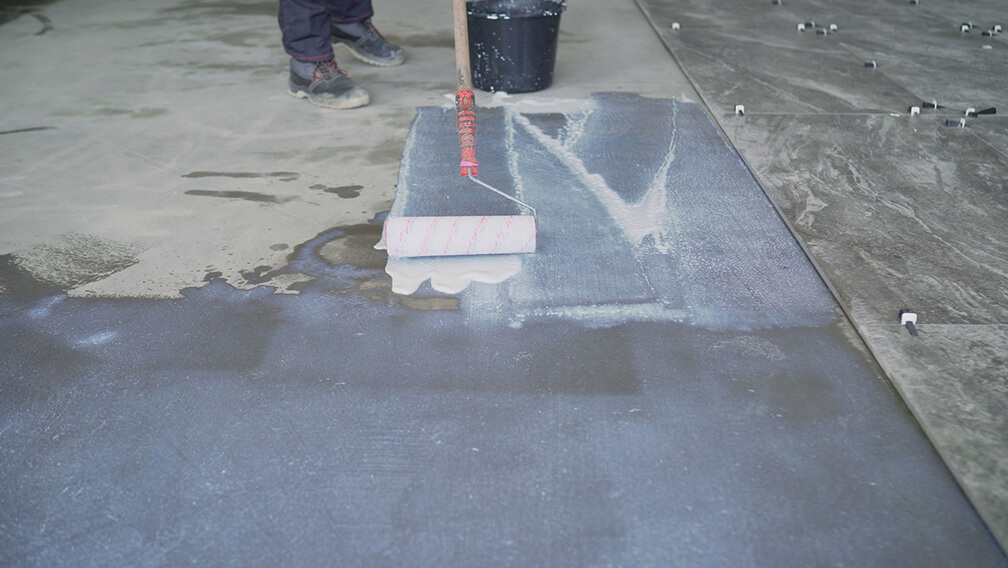
Concrete sealing isn’t magic, but it’s a smart process.
Here’s a simple breakdown of how it protects your concrete:
First, the concrete surface needs to be cleaned well. This gets rid of dirt, grime, and anything else that might stop the sealer from sticking. Think of it like preparing a wall before you paint it – you want a clean, smooth surface.
Once the surface is clean and dry, you apply the sealant. This is usually done with a sprayer, roller, or brush, much like painting. The goal is to get an even coat across the entire concrete area.
Now, here’s the key part: the sealant doesn’t just sit on top. It penetrates the tiny pores in the concrete. Concrete, even though it looks solid, is full of microscopic holes. The sealant soaks into these holes, filling them up.
As the sealant dries and cures, it creates a protective barrier within and on the surface of the concrete. This barrier acts like a shield, preventing water, oils, chemicals, and dirt from seeping into those pores. Because these harmful substances can’t get in, they can’t cause cracks, stains, or breakdown over time.
It essentially makes your concrete less absorbent and more resistant to damage from the elements.
Why Should You Seal Concrete?
Sealing concrete has many good points, helping you protect your investment and keep your property looking its best:
Stops Water Damage:
This is super important, especially for homes in New Jersey. Our climate sees a lot of changing weather, from sunny days to freezing winters. When water soaks into unsealed concrete and then freezes, it expands. This expansion creates tiny cracks, which get bigger over time.
This is called the freeze-thaw cycle, and it’s a major reason concrete breaks down. Sealing stops water from getting in, greatly reducing this damage. It also helps prevent things like efflorescence (that white, powdery stuff on concrete) and stops chemicals from soaking in, keeping your concrete healthier.
Fights Stains and Chemicals:
Concrete is naturally porous, meaning it has tiny holes that can absorb liquids. Spills from things like motor oil, gasoline, rust, or even spilled food and drinks can quickly soak in and leave ugly, hard-to-remove stains.
Over time, some chemicals can even start to break down the concrete itself. A good sealer acts as a barrier, making it much harder for these liquids to penetrate. This gives you time to clean up spills before they cause permanent damage.
Lasts Much Longer:
By protecting your concrete from water, chemicals, and everyday wear, sealing can truly extend its life. Think of it like a protective skin. Without it, your concrete surface is exposed to constant wear from foot traffic, car tires, and even the sun’s harsh UV rays.
We believe that proper sealing can add several years to your concrete’s lifespan, sometimes up to 5-10 extra years, depending on the sealer and traffic. This means you won’t have to face costly repairs or replacement as soon.
Looks Better for Longer:
An unsealed concrete surface can quickly become dull, dirty, and discolored. Dirt, grime, and even mold can build up in its pores. A sealer locks out these elements, keeping your concrete cleaner.
Plus, many sealers enhance the concrete’s natural color or provide a beautiful finish, from a subtle matte to a rich, glossy shine. This not only boosts your home’s curb appeal but also makes your outdoor spaces, like patios and driveways, more inviting.
Different Kinds of Concrete Sealers
Different Kinds of Concrete Sealers
Outdoor concrete faces all kinds of weather, strong sun, and other outdoor elements. Think about the hot summers and snowy winters we get across New Jersey, from Jersey City to Princeton.
That’s why picking the right sealer is key for lasting protection. Each type offers different benefits:
1. Penetrating Sealers:
These sealers don’t sit on top of your concrete; they soak deep inside it.
- Silane Sealers: These are great because they go deep into the concrete. They provide excellent protection against water, salt (especially important if you use de-icing salts on your driveway), and the freeze-thaw cycles that can crack concrete in places like Newark or Trenton. They don’t change the look of your concrete.
- Siloxane Sealers: Similar to Silanes, these also push away water, helping to prevent moisture from getting in. They are very effective at stopping efflorescence, which is that white, powdery stain you sometimes see on concrete surfaces. Like Silanes, they usually don’t change the concrete’s appearance.
2. Acrylic Sealers:
These are more like a protective layer that sits on the surface of your concrete.
- Water-Based Acrylics: These are a popular choice for outdoor use because they protect against the sun’s UV rays, water, and mild chemicals. They are easy to apply and come in various finishes, so you can choose if you want a glossy or matte
- Solvent-Based Acrylics: These offer tougher protection and are often chosen for busy areas like driveways where there’s a lot of traffic. They tend to be more durable and usually give your concrete a nice, glossy shine.
3. Polyurethane Sealers:
These sealers are known for being very tough and long-lasting.
- Water-Based Polyurethanes: They provide strong resistance against UV damage from the sun, stains, and everyday scratches. They work well for various outdoor concrete surfaces.
- Solvent-Based Polyurethanes: These are even stronger, offering excellent durability and resistance to harsh chemicals. If you have concrete that gets a lot of heavy use or exposure, these are a great option.
- Epoxy Sealers: While you might think of epoxy for indoor garage floors, some clear epoxy products are designed for outdoor use. They create a very hard, shiny surface that stands up well to chemicals and heavy wear.
- Polyaspartic Sealers: If you’re looking for a fast solution, Polyaspartic sealers are a good choice. They dry very quickly, which is great for projects with tight timelines. They also resist damage from the sun and are very durable.
4. Concrete Densifiers:
These are different because they work within the concrete itself to make it stronger.
- Silicate-Based Densifiers: These liquids soak into the concrete and react with it to make the surface harder. This makes your concrete more resistant to scratches, dusting (where tiny bits of concrete break off), and water soaking in. They are often used on outdoor surfaces where strength is key.
5. Stamped Concrete Sealers:
If you have decorative or stamped concrete (the kind that looks like stone or brick), there are special sealers just for these surfaces.
They are designed to enhance the color and patterns, provide good protection, and help your beautiful decorative concrete last longer.
6. Finishes:
No matter the type of sealer, you often get to choose the final look. Many sealers, whether they’re acrylic, polyurethane, or epoxy, come in different finishes.
You can pick a high-gloss (shiny) look or a more natural matte (dull) appearance, based on what you like best for your home.
When you’re picking an outdoor concrete sealer, always think about your specific concrete, the typical weather where you live (like here in New Jersey), and exactly what kind of protection you need most. And remember, always follow the instructions from the sealer’s maker for the best results and to make sure your concrete seal lasts as long as possible.
How Long Until You Can Walk on Sealed Concrete?
How long you have to wait depends on a few things: the type of sealer, the temperature and humidity, and the condition of your concrete.
-
Drying Time vs. Curing Time:
- Drying time is how long it takes for the sealer to feel dry to the touch. This can be a few hours to a full day.
- Curing time is how long it takes for the sealer to fully harden and reach its strongest point. This can take 3 to 7 days.
-
What Changes the Time?
- Type of Sealer: Some sealers, like acrylics, dry faster than others.
- Weather: Warmer, less humid days mean faster drying. Cold, wet days mean slower drying.
- Concrete Condition: Old or cracked concrete might take longer to dry and cure.
-
When Can You Walk on It?
- Generally, you should wait at least 24 hours before walking on sealed concrete. But always check the instructions on your specific sealer product for the best advice.
Factors That Affect Drying and Curing Time
Several factors can affect the drying and curing time of concrete sealants, including:
- Type of sealant: Different types of sealants have different drying and curing times. For example, acrylic sealants dry faster than polyurethane sealants.
- Temperature and humidity: Higher temperatures and lower humidity can speed up the drying and curing process, while lower temperatures and higher humidity can slow it down.
- Condition of the concrete: If the concrete is old, damaged, or has a lot of cracks, it may take longer for the sealant to dry and cure.
How Long After Sealing Can You Walk on Concrete?
In general, you should wait at least 24 hours before walking on sealed concrete. However, this can vary depending on the factors mentioned above. It’s always best to follow the manufacturer’s instructions for your specific sealant.
How Often Should You Seal Concrete?
The frequency of sealing concrete depends on several factors, including the type of sealant used, the amount of foot or vehicle traffic, and the weather conditions. Generally, sealing concrete every 3-5 years is recommended, but this can vary.
Signs That Your Concrete Needs to be Sealed
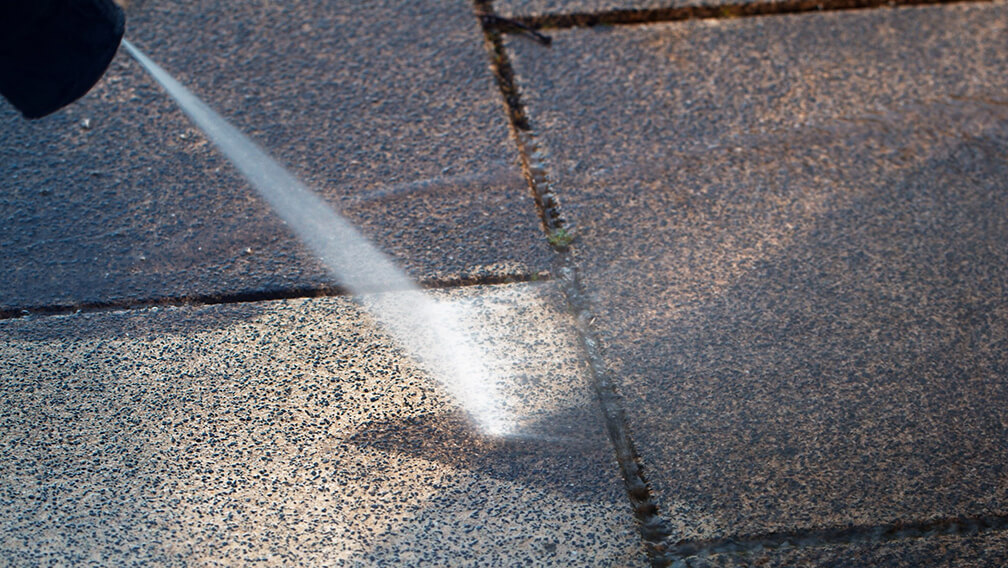
Sealing your concrete is great for protection. But it’s important to know that sealing won’t fix problems with sinking, cracking, or uneven concrete. Putting sealer on damaged concrete can sometimes trap water and make things worse, especially with New Jersey’s tough freeze-thaw cycles.
Here are signs that your concrete might need more than just sealing, and when you should call us:
- Uneven Slabs: If one part of your driveway or patio is lower than another, it can cause a trip hazard.
- Large Cracks: Hairline cracks are normal, but big, wide cracks mean something deeper is wrong.
- Standing Water: If water pools on your concrete after it rains, it could mean the concrete is uneven and guiding water to the wrong spots.
- Sinking Concrete: You can see parts of your concrete sinking.
These issues usually mean the ground under your concrete isn’t stable. This is exactly what Concrete Chiropractor fixes!
We use a method called mudjacking or concrete leveling to gently lift and stabilize uneven concrete slabs. This fixes trip hazards, improves drainage, and makes your concrete safe again.
We Can Help You Restore Your Concrete!
Sealing your concrete is a smart step to protect it. But if you’re seeing signs of unevenness, sinking, or large cracks in your concrete, sealing isn’t the right answer. You need a solution for the underlying problem.
At Concrete Chiropractor, we specialize in fixing uneven concrete for homeowners across New Jersey, from Edison to the Shore.
Contact us today for a free inspection!
We’ll check your concrete and let you know if concrete leveling is the right solution for you. We’re here to help you get your concrete back to its best.
- How We Raised a Sunken Concrete Walkway in Sewell, NJ - November 20, 2025
- Carbon Fiber Foundation Repair: All You Need to Know - November 20, 2025
- 5 Common Causes of Concrete Porch Collapse (and How to Prevent It) - November 20, 2025

